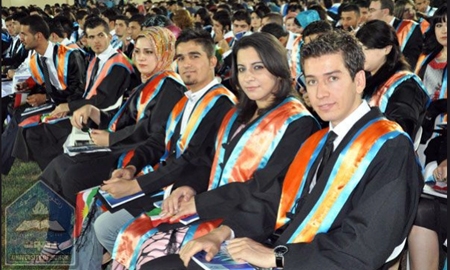As an autonomous region, Kurdistan has a great deal of independence when it comes to administering itself and its dealings with foreign partners. In the field of education, the Kurdistan Regional Government (KRG) has taken a strong stance on human resources and capacity development, revitalising research in higher education institutions and internationalising the sector.
Recently, the KRG launched the Human Capacity Development Programme (HCDP) to provide Kurdish graduates with scholarships for study abroad, particularly in the areas of science and technology. An annual budget of 120 billion dinars ($103 million) has been allocated, thus giving students a fair opportunity to pursue degrees in internationally renowned universities and return to Kurdistan well equipped to help modernise the region’s economy.
Of the approximate 2,000 students currently studying overseas, some 80 per cent have chosen to do their masters and PhDs in the UK. Dr Amanj A Saeed, Advisor to the Minister of Higher Education, attributes this to various factors.
“The historical link between the UK and the Kurdistan region is one. We have a very strong Kurdish community in the UK. On top of that, UK universities were very, very active from the beginning of the scholarship programme. They sent representatives over and put on university fairs. They also helped students with the application process, arranged several courses, etc,” he explains.
Dr Saeed adds that Kurdish students prefer English-speaking countries and that the British Consulate in Erbil provides valuable services, including visas, meaning scholarship recipients do not need to travel to Oman or Baghdad to apply.
One setback, however, is the language. Although Kurdish, Arabic and English are all used in lectures, classes and seminars, oftentimes students’ levels of English are insufficient for pursuing higher education in the UK. Consequently, the KRG plans to invest in English-language teaching.
“We have to ask the UK for help and invite higher education institutions and language course providers to deliver language courses in Kurdistan before the students leave,” says Dr Saeed.
UK universities already collaborate in Kurdistan through direct partnerships with local universities. Dr Saeed cites the example of the University of Soran and University College Plymouth St Mark & St John (Marjon). The latter established an English language centre at Soran, providing the staff, instructors and management, while Soran provides the infrastructure and quality assurance.
“We are planning to adapt the Soran model to most of the collaborative work that we are planning to do with the UK at the moment,” adds Dr Saeed.
Furthermore, Kurdistan universities are launching an increasing number of joint research projects with UK institutions – including the University of Leicester, Plymouth University and the University of Nottingham – while others, such as Queen’s University Belfast and the University of Essex, have expressed interest in opening branch campuses in the Kurdistan region.
Former Minister of Education and current spokesperson for the KRG, Safeen Dizayee stresses that Kurdistan can benefit from cooperation with the UK, especially in basic education and vocational schools. One of the problems in the Kurdistan region, he says, is that the Kurdish culture is to direct children towards certain professions, thus leaving a gap for skilled labour.
“That is presently being filled by foreign labour, while our young people remain unemployed,” he laments.
“The Ministry of Education presently has a project of revitalising vocational schools in order to make it attractive enough for school leavers to learn a skill at vocational schools. Then they can immediately enter the market after graduation and employers will be after them – and not the other way round. The vocational school system in the UK is one area we could learn from. In fact, there have been negotiations through the British Council here to receive their assistance.”
Kurdistan’s first universities (Salahaddin University and University of Sulaimani) were founded in 1968 and were the only ones until 1992, when the University of Dohuk was established. Today, however, there are 19 state and private higher education institutions, which include universities, technical and comprehensive universities, and specialised institutions at university level. Nearly 50 per cent of the region’s 94,700 tertiary level students are female, and tuition is free, as education is considered a basic right in Kurdistan region.

0 COMMENTS